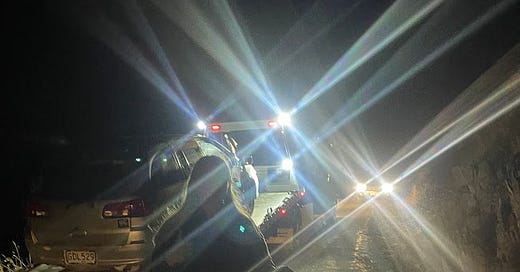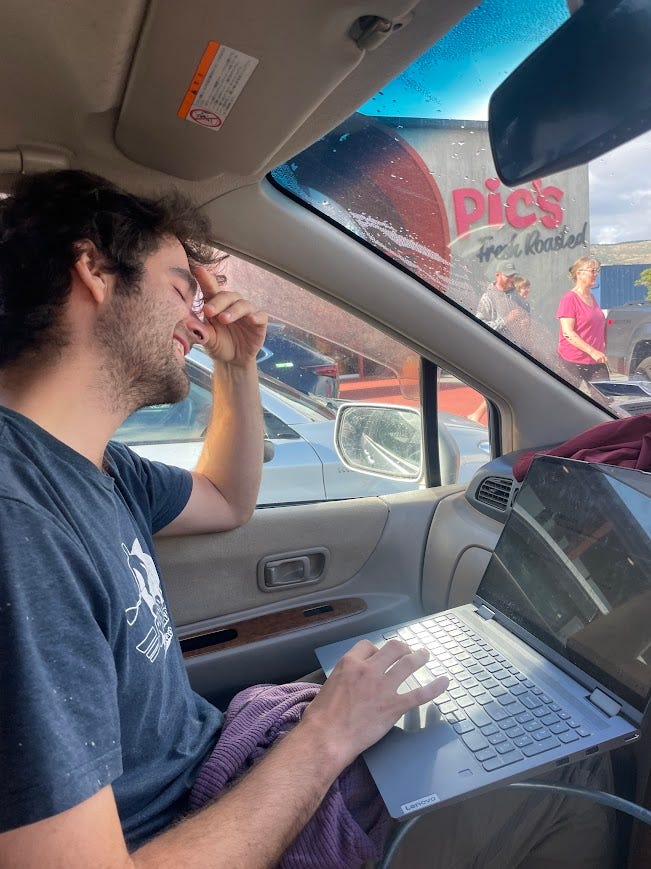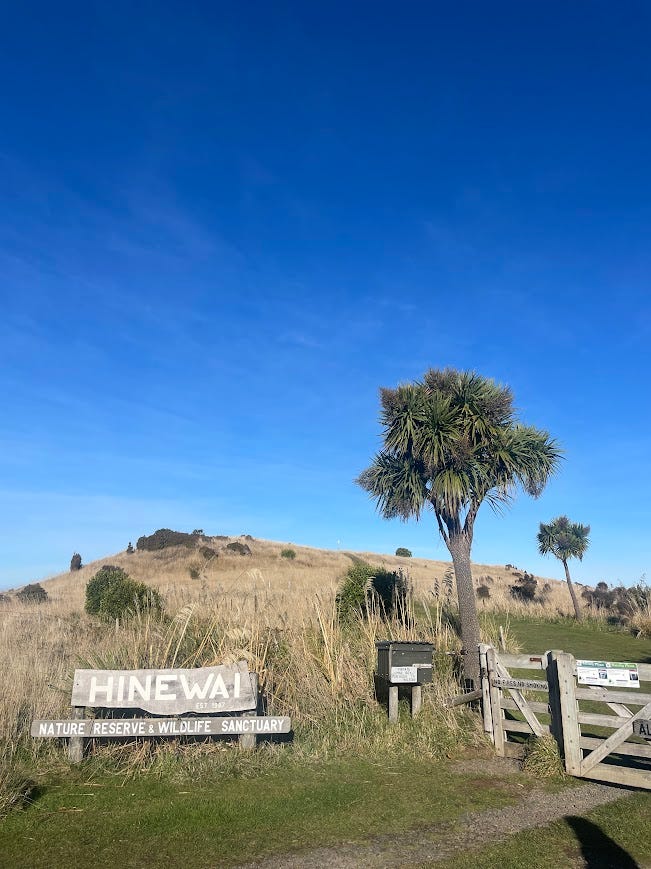Breaking Down Money... and Our Van!
Finding unexpected freedom from financial stress and shame during a year of travel
Hello once again from the beautiful Banks Peninsula! We can’t believe we have only a week left here – well, if all goes according to plan! We are a bit marooned at the moment! We’ve been talking about writing a post about finances for a while, as this is a topic that feels ever-present on a working holiday. Well, be careful what you wish for, because our van breaking down has given us a clear reason to do so!
The Curse of the Southern Lights
While our friends back home traveled near and far to see the Northern Lights, the Southern Lights were equally impressive in New Zealand! We left work on a Saturday night and saw the sky’s reddish hue. We sprinted uphill to our car, but the battery was dead! After a quick jump, we had missed peak visibility. Fortunately, we’d have another chance the next night. After our shift, we began the ascent up to Misty Peak, one of the highest points on the peninsula accessible without four-wheel drive. Unfortunately, the steep hill proved too much for our poor van. A short distance from the top, we sputtered to a stop before beginning to roll backwards downhill. After putting on the e-brake, we determined we couldn’t safely get down the hill. We felt really grateful that even though we live in a small town, a tow truck was able to come fairly quickly, even at the late hour! Conveniently, since we live in our van, we also had blankets to use while we waited. We also felt lucky for the community we’ve built, as our housemates all offered to come get us and help us out while our car is out of commission. The Southern Lights, for their part, never showed – cursed!!
When the mechanic’s initial diagnosis of our engine was, in technical terms, “f*cked,” I cried. My first instinct was to cut our losses, flee the country, and never tell a soul about how we made the apparent financial mistake of buying an old van that lasted us all of two months. I felt so disempowered not having the knowledge to make the best decision. But after the initial reaction wore off, I realized I was so much less stressed than I would have been in a comparable situation a year ago. I knew that we had planned for this risk, that the van had already paid for itself as a combined housing/transportation cost, and that the reason we were working was explicitly to fund our continued travels. Confronting one of our worst-case-scenarios showed me how much my relationship to money has changed for the better over the course of a working holiday.
Season of the Sticks
The same week that our car broke down, our workplace announced that everyone’s hours were going to be cut significantly as business slows down for the winter. The general sentiment among the staff was one of stress and frustration, as we had all been put on guaranteed hour contracts that would no longer be honored. Everyone found themselves needing to find second jobs or move up their leaving date. It just goes to show how a little communication goes a long way, as everyone expressed they would have agreed to a shorter contract or just not taken the job if they had been warned. And how important labor unions and worker solidarity are! The situation brought the topic of finances from the personal to the collective, as we all discussed our wages and the wording of our contracts. I wouldn’t even have considered that we might have a right to the lost wages from our broken contracts if we hadn’t talked about it. We also shared worries that challenging our employer could potentially lead to repercussions that would impact long-term employees.
Since we had already planned to leave at the end of the month and had our second jobs as trappers, we initially weren’t too fussed about having our hours cut, until we realized we might have major car expenses! While we aren’t exclusively dependent on our restaurant wages, it still sucks to potentially lose your housing, transportation, and source of income in the same week!
The whole situation feels really demonstrative of the highs and lows of travel, with the specific flair of a working holiday. One day you are lounging by the most beautiful coastline you have seen in your life, and the next you are experiencing financial stress in the peanut butter world parking lot. Thankfully, the highs truly have been much more frequent than the lows. Even during a week where we’re anxiously waiting to find out if our car is totaled, we have still been having stunning walks and lovely evenings by the fire with our friends. And of course, these types of unexpected expenses can pop up and disrupt your life at any point. The contrast just feels more dramatic when you’re on holiday!
A sibling to the highs-and-lows of travel is the boom-bust cycle of finances on a working holiday. While there are many different approaches, the nature of seasonal work means that most people have several different jobs broken up by periods of travel. It’s common to live more frugally during working periods, saving up and spending as little as possible on food or entertainment. This enables being fully in tourist mode in travel periods, spending money until it runs out and it’s time to look for a job again. While I wouldn’t say this has been our exact approach, the short-term sustainability of this is what appealed to me about the working holiday. Thinking of the finances *within* the working holiday (so not accounting for some significant upfront costs we budgeted for, as well as the fact that this is not a year of accumulating savings) as a closed loop (we make what we spend and we spend what we make) feels much more manageable than a travel year where we’re only spending. While it’d be great if we were making the kind of money we could bring home with us, it’s also nice to look at our New Zealand bank accounts and know that we have that fully available to enjoy our travels.
Finances on a Working Holiday
It can feel difficult to talk about finances openly. Especially in a system that you don’t agree with – one that exploits people, creates winners and losers, and then shames people for financial failures that are ultimately systemic rather than individual. Even among people who are sensitive to these issues, it sometimes feels like the conversation is limited to acknowledging the financial privilege you have or don’t. And yet it’s safe to say most people still want to be financially secure, even if we might advocate for the system to be different and seek alternatives wherever possible.
Pursuing long-term travel, a life experience that a lot of young people say they want, has made me feel more aware of and open about the finances that enable this decision. I used to assume that young people traveling the world must either come from family wealth or be completely broke. I wondered if, in my choice to travel abroad long-term, I would be perceived as either financially irresponsible or secretly rich. The reality is, for me, a third option: neither rich nor broke, but forced to move from a passive approach to my finances to an active one via the choice to live abroad.
It feels embarrassing to admit, but my approach to finances before this year was essentially to cover my eyes with my hands and try to minimize spending outside of my major hobbies (some of which are expensive, like traveling internationally!). And for the most part, this approach has worked for me. While I can sometimes be frugal to an unhealthy extreme, for the most part, thriftiness has saved me a lot. But don’t count me as some soap boxer going on about how millennials could afford homes if they just stopped going out to brunch. Whether it be student debt, staggering healthcare costs, the demands of childcare/eldercare, or stagnating wages, there are real reasons people in my generation have financial stress that can’t be fixed by buying off-brand at the grocery store or favoring budget airlines.
For the majority of my 20s, I avoided doing any kind of broader personal financial check-ins with myself. I did what I was told were the basics: contributing generously to my retirement, putting my cards on auto-pay, and spending less than I made. Other than that, I didn’t want to ask any questions. If I had ever bothered to check in with myself, I would have discovered that things were going well! That I didn’t need to panic about unexpected costs, or feel guilty about eating lunch out when I hadn’t had time to meal prep. Beyond the general assumed societal goals like covering emergencies or owning a home, I hadn’t considered what other goals I might be saving for in the 40+ years before retirement. My passive relationship to my finances made me extremely anxious that my inaction was going to harm me later.
One of my major efforts for the past two years has been confronting my fear of the topic of personal finance. As someone who doesn’t come from wealth, even just thinking about topics like investing would literally bring me to tears. I felt so overwhelmed by my lack of understanding of these systems. I felt doubly overwhelmed at the prospect of choosing to invest my money in companies that are actively contributing to and causing climate change, public health crises, and global inequality (spoiler: this was happening via my employer-sponsored retirement accounts whether I was paying attention to it or not)
I didn’t know how to see money as a means-to-an-end, unless that end was just not being stressed about money. Which is a fair goal, but I wasn’t even achieving this! I didn’t know what it meant to be “on track,” and I felt overwhelmed by the deluge of media saying that people my age, even with my level of education, are doomed when it comes to our financial futures. It felt like my options were to view myself as a victim of my generation, or to lean into the often inaccessible, oversimplified, and bro-y culture of the personal finance industry.
Last year, under the weight of burnout, I began to think about leaving my job without having another one lined up. Finances, understandably, were one of the biggest barriers to doing so. If I was going to forgo income, especially to travel, there was no way that I could continue to get away with such a laissez-faire approach. I wanted to minimize financial stress both during the time abroad and after returning. This started with basic steps, like making sure I knew how to get into all my accounts (passwords are hard!). Then I worked my way up to consolidating my retirement accounts. I put some savings aside in a CD (in particular, at a community development financial institution that invests in low-to-moderate income communities) to save for goals that I would be deferring during my travel years, like owning an apartment. More recently, I’ve started finding sources to educate myself about personal finance that align with my values. One of my favorites has been the newsletter Healthy Rich, which offers critical perspectives on the ways we think, teach, and talk about money. Her primer on the ways budget culture promotes shame over conscious spending is a good place to start.
It took making such a significant, potentially risky change as leaving a job to travel to realize that the decision was available to me at a cost I felt comfortable paying (a few thousand dollars). So it’s a little backwards, but I did not save for this trip. I saved in general, without knowing what I was saving for, and then decided to use some of those savings to take a year off from my career path. While I am grateful it has worked out, I also could have been a lot less stressed for the years preceding this decision, or taken the time off I needed a lot earlier.
In a year where I am making less money than before, I ironically feel more free from financial stress. I actually understand the state of my finances and am making empowered choices about what I want to do with them. A recent call with a financial advisor made me realize how my relationship to my own finances (and my options for my life, more broadly) had moved from one of scarcity to one of making informed decisions based on what is possible. After I explained why I wouldn’t have U.S. income this year, he told me he wished he could spend a year abroad like me. After years of feeling so worried about making the “wrong” choices with my finances, it felt validating to confidently explain what I was doing to someone who ostensibly knows so much more than me about goal-oriented money management. I have felt constrained by fears around money for my entire life, so this emerging confidence feels like a huge shift. I am already thinking more expansively about the choices available to me after this working holiday.
Wrapping up
Since our car broke down, the prognosis and next steps have been a bit of a roller coaster. We’ll spare you the details, but the main takeaway is that we may be able to fix our car that was previously deemed “buggered” for just a few hundred dollars!? Whether Goldie lives to see the next part of our journey remains to be seen! Until then, we are enjoying our last week of hanging out with our housemates and finishing off our Akaroa bucket list!







